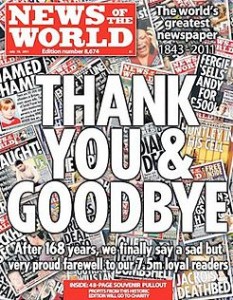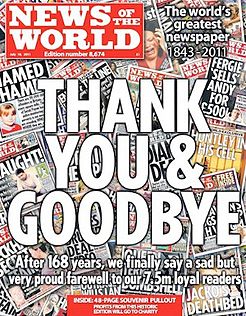 THUNDER BAY – There is a debate raging in Great Britain over the relationship between the press and the police and politicians. Speaking in the British House of Commons, Prime Minister Cameron stated, “Lord Justice Leveson makes clear that he doesn’t find a basis for challenging the integrity of the police. But he does raise a number of areas which he felt were a cause for public concern such as tip-offs, off-the-record briefings and more broadly, “excessive proximity” between the press and the police”.
THUNDER BAY – There is a debate raging in Great Britain over the relationship between the press and the police and politicians. Speaking in the British House of Commons, Prime Minister Cameron stated, “Lord Justice Leveson makes clear that he doesn’t find a basis for challenging the integrity of the police. But he does raise a number of areas which he felt were a cause for public concern such as tip-offs, off-the-record briefings and more broadly, “excessive proximity” between the press and the police”.
The scandal that led to the inquiry was allegations that members of the British press, specifically ‘News of the World’ had ‘hacked’ into the wireless phones of celebrities and reported on what they had found. The newspaper has since been shut down by the owners of the company. News International announced the shuttering of the newspaper on 7 July 2011.
The ongoing scandal has yet to fully play out, and there are potential legal implications still to come forward.
On the relationship between the press and politicians, Cameron said, “As Lord Justice Leveson has found ‘over the last 30-35 years and probably much longer, the political parties of UK national Government and UK official Opposition, have had or developed too close a relationship with the press in a way that has not been in the public interest’ ”.
“I made this point last summer when I set up this Inquiry – and at the same time I set in train reforms to improve transparency,” Cameron continued. “This is the first government ever to publish details of meetings between senior politicians and proprietors, editors or senior executives, as Lord Justice Leveson recommends in his report. He also recommends disclosing further information on the overall level of interaction between politicians and the press”.
“This would apply to all parties – and on the Government’s behalf I can say that we accept that recommendation,” added Cameron.
Cameron adds, “He makes a number of recommendations including national guidance on appropriate gifts and hospitality; record-keeping of contact between very senior police officers and journalists and a 12-month ‘cooling-off’ period for senior police officers being employed by the press. These are designed to break the perception of an excessively cosy relationship between the press and the police and we support these recommendations”.







